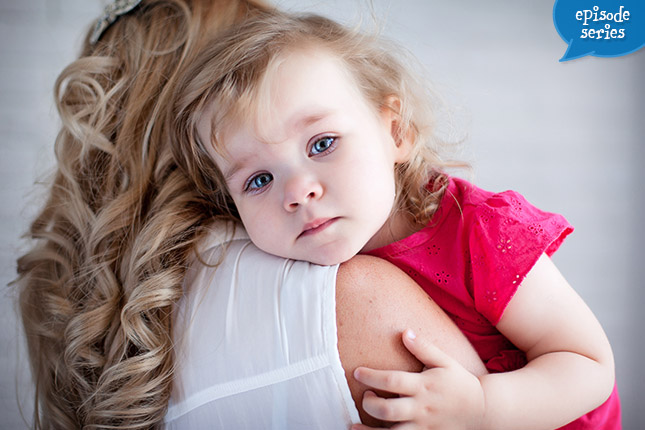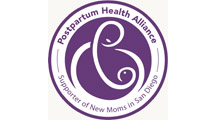Newbies
Delayed Postpartum Depression: The Symptom
[00:00:00]
Please be advised, this transcription was performed from a company independent of New Mommy Media, LLC. As such, translation was required which may alter the accuracy of the transcription.
[Theme Music]
KRISTEN STRATTON: Not every women who have a perinatal mood and anxiety disorder experience the symptoms immediately after giving birth. Some symptoms begin up to a year up to eighteen months after delivery particularly during time of hormonal changes. Every women may have ongoing symptom that go undiagnosed or untreated and carry into subsequent pregnancies. Today, we’re discussing common symptoms of delayed postpartum depression, the under treated and often ignored symptoms that may carry into subsequent pregnancies. This is Newbies.
[Theme Music/Intro]
KRISTEN STRATTON: Welcome to Newbies. Newbies is your online on the go support group guiding new mothers through their baby’s first year. I’m your host Kristen Stratton, Certified Birth Doula, Postpartum Doula and owner of Induced Season Doula Services. If you haven’t already, be sure to visit our website at www.newmommymedia.com and subscribe to our weekly newsletter, you can also subscribe to our shows through iTunes so you’ll automatically get new episodes when they’re released. Sunny’s here to tell us about other ways you can participate in our new shows.
SUNNY GAULT: So a great way for you guys to get involved and it really helps us out as well is by leaving us a review on iTunes. It is absolutely huge, a huge portion of our audience actually finds us through iTunes. And the way iTunes works is, the more people rate and review podcasts, the higher the podcasts basically appeared in different search results, right?
So if you go into iTunes and you’re typing in something about Postpartum Depression, well, the episodes that had more listens in postpartum depression are going to pop up sooner. So to find our show as a whole, it really does help us if you review us. So if you could take couple minutes, that would be super huge with us. Obviously, we would help many moms out there who recently had a baby and maybe struggling with some of the issues that we’re talking about on our show. So the best way to do that, there’s actually couple of different ways, you can do it straight through the apps on your phone. So if you have an iPhone app, the podcast apps you can search for it that way and you can rate and review it. If you have iTunes on your computer, an easy way to do it is search for Newbies and then right under the logo for our show, you can rate and review us. So you just click a couple of quick buttons and type out a review, and we would like to know what you think of the show. So if you could take a couple minutes to do that, it would be really awesome and it would help other parents find our show. So that’s a great way to get involved.
KRISTEN STRATTON: Alright, let’s meet our panelists.
BETH WARREN: Hi, my name is Beth Warren, I’m a psychotherapist in private practice here in San Diego, in the UTC area. I specialize in reproductive psychiatry and women’s health which is perinatal mood disorders, infertility, pregnancy loss, adoption and surrogacy, and I sure love helping couples embrace their new parenting roles, become their most solid selves throughout this tremendous life transition, and I feel very grateful to be working in this field. I’m also on the Board of Directors for the Postpartum Health Alliance which is a great nonprofit organization that we’re going to talk about later when we get to resources.
MICHELLE CLOOKIE: Hi, my name is Michelle Clookie and I’m super excited to be here. I am currently a mom to my daughter Charlotte who is 2 and I’m currently pregnant due hopefully right after this show.
KRISTEN STRATTON: Maybe immediately after.
MICHELLE CLOOKIE: Immediately after. Or if I hop off, it’s because I’m going into labor with a little boy and his name is Beckett. I also consult part-time with San Diego Postpartum Health Alliance.
KRISTEN STRATTON: Nina?
NINA: Hi, I’m Nina. I’m 33 years old from North Carolina. I have a 4 ½ year old red headed boy and I work for Early Intervention Services for North Carolina helping families and their children from birth to aged 3.
KRISTEN STRATTON: I love that you have a red-headed child club because I have 2 out of 3 that are red-heads.
NINA: I love it.
KRISTEN STRATTON: Gather those feisty redheads.
NINA: Absolutely, I tried to dye my hair that color, for like the first year, it didn’t work.
KRISTEN STRATTON: Yeah, no it doesn’t. It’s like you can’t replicate that color, its impossible.
NINA: It is.
KRISTEN STRATTON: Alright. Well, thank you so much for joining us, it’s great to have you guys on the show.
SUNNY GAULT: So from time to time on our show, we like to review Apps. We think that parents are always on the go and we’re always downloading new Apps, right? So why not parenting Apps, and the Apps that just help us be better parents. So to go along with the theme, we found an App called PPD Gone! okay? And I downloaded it and just started to check it out a little bit, just to see the functionality and everything of it. It is a free app that’s available for iPhone and it seems to have some really cool things. For example, there’s a lot of information. I love how they said this, “pre-partum depression”, information on pre-partum depression, goes more in-depth about what is postpartum depression, the causes of it, the symptoms, will it go away? A lot of common questions that I think a lot of people have about postpartum depression.
There’s even a section for postpartum depression in new dads, recovering from postpartum depression, and it’s actually created by Shoshanna Bennett, and I wasn’t aware who Shoshana was, and it says she’s a PhD, but beyond that, I didn’t know very much. And Beth, who is our expert today, you’re more familiar with Shoshanna, who is Shoshanna?
BETH WARREN: I've actually never met her but she's incredible. She is one of the original Presidents of Postpartum Support International which is a resource we’ll talk about in a bit, and she's written a number of books on postpartum mood disorders, including one that's called "Beyond the Blues" which is a pretty famous one. She's just a major advocate for women who are going through prenatal mood disorders, and she's an incredible resource. So it's neat that she's created this App that can be so user-friendly.
SUNNY GAULT: Yeah. Like I said, there's a lot of good information on it, there's actually some audio files on here that you can listen to, that deal with different topics, there are some links to videos that you can watch as well, you can click through on different resources that are available. For example, you can get a free postpartum depression assessment, there's a link for that, there's a link directly to Postpartum Support International. Some of these links we'll include on our website for actually this episode. But just a great thing to check out. If you guys have a few minutes, and you can always have this obviously at your fingertips, so wherever you go, there is some information, especially if you think you have some of the symptoms and may want some more information about it. So go ahead and check it out. I'll go ahead and put a link to this on our website so you guys can download it there and read a little bit more about.
[Theme Music]
KRISTEN STRATTON: Newbies is proud to partner with the Postpartum Health Alliance for a new series focusing on delayed a postpartum depression. Today, we'll provide an overview on this disorder. Our expert is Beth Warren, licensed clinical social worker and psychotherapist with the Postpartum Health Alliance. Thank you so much for joining us Beth and welcome to the show.
BETH WARREN: Thanks for having me, I'm so glad to be here to talk about such an important topic.
KRISTEN STRATTON: Let's review for our listeners. What is a Perinatal Mood and Anxiety Disorder or PMAD?
BETH WARREN: So a Perinatal Mood and Anxiety Disorder is different than another mood disorder such as Regular Generalized Anxiety Disorder or a Major Depressive Disorder. A Perinatal Mood and Anxiety Disorder is exactly what it sounds like, it either originates during the pregnancy period for women or during the postpartum period for a woman. So there's several different types that fall under this overall category of a PMAD, and that includes a postpartum depression which is the more commonly known postpartum mood disorder, typically incorporate symptoms of sadness, irritability, insomnia, anhedonia which means the things that typically make you happy no longer are doing so, a lack of motivation that there could be a potential impact of delayed bonding with the baby, etc. There's also postpartum anxiety which is typically presented like a woman who has racing thoughts that are much more intense than her baseline, worrying constantly, it can include intrusive imagery, like picturing really horrible things happening to herself, to the baby, etc., just general fear at all time and worrying, typically will impact a woman's socialization, usually she's pretty isolated as a result. Like if she believes that she can't go out to the grocery store because "all my gosh I couldn't handle it if might baby cried", typically then she starts avoiding that activity as a result. So there's postpartum depression, postpartum anxiety, we've already covered, there's also Post-partum Obsessive Compulsive Disorder which again is exactly what it sounds like, obsessions or obsessive thoughts and or compulsive actions that can begin during the pregnancy or postpartum period. The compulsive action is usually served to manage the anxious thoughts but it doesn't work, and so the anxiety tends to get worse and worse. And then last but not least most severe postpartum mood and anxiety disorder is called Postpartum Psychosis. Thankfully, it’s very rare and it is a true medical emergency and this is when a woman really has lost touch with reality, it's either having hallucinations, delusions, etc. It can get quite dangerous. Luckily, all of these are very treatable. It's the two big T's I always tell my clients, that this is Treatable and this is Temporary, just to be able to instill some of that hope. We know a woman can be at higher risk for a PMAD because of either genetic, biological or environmental factors. Genetic meaning that maybe she has a personal history of mental illness or a family history of mental illness, she might be at higher biological risk because she might be an older mother, maybe has gone through infertility, pregnancy loss ,maybe she has multiples. An environmental risk factor might be significant family stress during the pregnancy, maybe she was laid off and there are some financial stressors, maybe there was a great transition during her pregnancy like they moved, etc. And having a real colicky or fussy baby can also put you at higher risk. So that's just a big overview of perinatal mood disorders.
KRISTEN STRATTON: How is delayed postpartum depression different from other postpartum mood disorders?
BETH WARREN: So it's a great question because typically, we see the onset of postpartum mood disorders either during the pregnancy period or at right around after that first month after birth. So the interesting thing to know though and this is why I'm so glad we're doing this Podcast today, is postpartum mood disorders can actually occur any time in the first year or a year and a half after delivery, and often will occur during times of great hormonal change. So a time of great hormonal change is of course pregnancy, and it is of course delivery, but several other big hormonal transitional times are when a woman gets her first period after delivering the baby, when she starts birth control again, and when she weans breastfeeding. So all 3 of those are significant hormonal transitions that occur as you know. I mean, let's say a woman breast feeds for 2 years, that means that that hormonal shift doesn't occur for her until 2 years after the birth.
KRISTEN STRATTON: And what are some common reasons that women don't seek treatment right away?
BETH WARREN: One of the biggest I see actually is just because of a lack of information or a lack of knowledge. So a woman might think that if her symptoms don't start right away, let's say she becomes significantly depressed when she's about 4 months out, she starts noticing she's really irritable at her husband, she cries frequently, just feels a general malaise, she may not identify it as a postpartum mood disorder because she may not know that the symptoms don't need to hook her right after birth. A lot of lack of information I think leads to women not getting help because they think, "well, I'm not just laying in bed right after delivery bawling my eyes out, so what is this, I don't know what this is." So women might dismiss the symptoms, chalking them up to something else, like "oh I'm just tired", or they may not get treatment as a result of kind of dismissing and minimizing these symptoms. Another big one is shame, shame often plays a large role. Particularly if this is quite a big change in her personality or baseline, a woman might feel really guilty with your inability towards her baby or spouse, or maybe she doesn't feel really comfortable talking to her friends about her sadness when her friends are all talking about how amazing this time is for them.
KRISTEN STRATTON: And I was going to add to what you said Beth because there's also this culture of supermom and it's so easy to feel guilty for not being able to just jump right back into things or if you do and then like you said, you start feeling that way, it's immediately like what's wrong with me, as opposed to why can't I just go to my workout group and why can't I go to mops, and why can't I do all this, just this is go-go-go culture that we have.
BETH WARREN: I agree, and I think as women we tend to perpetuate that perfect motherhood myth.
KRISTEN STRATTON: Yes.
BETH WARREN: And social media just elevates that even more, right? Like nobody puts a picture of themselves at 2 in the morning bawling because their baby can't go to bed and has barfed everywhere and they're exhausted, no one post that picture.
KRISTEN STRATTON: No they post a picture of them and back in their skinny jeans.
BETH WARREN: Yes, with a filter.
KRISTEN STRATTON: With really like, "I just threw out the skinny jeans, good girl" yeah. And to our parents, did any of you experience delayed postpartum depression, and when did your symptoms begin? Let's start with Michelle.
MICHELLE CLOOKIE: So mine was more of just general, kind of what Beth was talking about with this anxiety and this overwhelming. And I think mine started around when Charlotte could interact with me, and it was right around the time that we stopped nursing, so that makes sense and I didn't actually know that. But really interact in the sense of she was walking, she was moving, she was a very early talker, so she was saying words to me and communicating more, and at that time, I was working full time too and I just felt like what am I doing? It's like I don't really know how to handle her big personality, handle my big personality, handle personalities that were, you know, all of that, and it was a little bit overwhelming. And me wanting to be that super mom and me posting those happy pictures on Instagram and Facebook, but yet still, afterwards, going ok, this isn't how I want to be, I want to feel a little bit more grounded.
BETH WARREN: And what about you Nina?
NINA: I think you Noah was about 5 months old right after I stopped breastfeeding, and I typically have a very outgoing personality, really bubbly and that kind of seemed to work against me because if I wasn't smiling, people were asking what was wrong, and I sure didn't want to tell them that I was crying in my car on the way to work and on the way home because I didn't know what to do in either place. I didn't really know who I was anymore or how I was supposed to act in either place. So that was it was really hard. And I think it was so different, just like you said, than anything I've ever dealt with. I never had anxiety before but I had a horrible postpartum anxiety and I would worry about the silliest things, things that I had said or thought about saying, even things that didn't have to do with Noah, just in general and that I didn't want anyone to know, I put all the really happy, adorable pictures on Facebook and when I finally, 2 years later, came out and said, you know, I guess it seemed like it was a big deal to come out and it shouldn't be, but it was, and said that I had postpartum depression, people were like, "oh, but you always seem so happy. “So it was difficult for me to do that, but once I did, to hear other people say, "oh yeah, I'm feeling that same way too", and I was like really? I really felt I was the only person in the whole world that's ever felt that. It lasted about 2 years before I started getting better. It's a journey for sure.
KRISTEN STRATTON: Yeah it kind of feels like your own private hell because you're sitting here, and like you said, you think I'm the only person that's ever felt this way, who's ever going to feel this way and if people knew what I'm thinking and feeling, they'd think I was a horrible mother or a horrible person, how dare you not be feeling all these euphoria and joy and having endless amounts of energy. It's really hard to just reconcile the fact that you are going through something and that it's worth investigating and that it's worth seeking help for if you need it.
NINA: Absolutely, when I first finally went to get help, I went kicking and screaming to get help. The counselor told me that it wasn't postpartum depression that it couldn't be that because it was too late. So that was really hard because I felt, "oh no, there really is something wrong with me." Luckily, that counselor ended up moving and I found another one, I still see her, she's very straightforward and she was like "well, of course, it's postpartum depression, and anxiety. I didn't know that was even a thing. So it's helped me so much to have therapy and medication and just talk to other moms and know that it's okay.
KRISTEN STRATTON: Beth, if untreated, can this continue throughout subsequent pregnancies?
BETH WARREN: Absolutely, which is why it’s so important that we’re talking about this? An untreated postpartum mood and anxiety disorder can actually become a real chronic ongoing condition and it may even worsen with time. So if this rolls into another pregnancy, so to speak, the woman's at huge risk for worsened symptoms, because now, of course we have the hormones of pregnancy and the stress of a new pregnancy. If she's at huge risk for having a quite emotionally difficult time during her pregnancy and/or exacerbated symptoms once she delivers. And of course, your second pregnancy, now you're also taking care of your first child as well as yourself during your pregnancy. And if you are also struggling with a mood disorder during that period of time, it's a lot to juggle. It's a lot piled on.
KRISTEN STRATTON: And what can happen if the PMAD is undiagnosed or untreated, even if there is not another pregnancy?
BETH WARREN: So it's just like before, it can really continue into a chronic condition and actually, symptoms can even worsen over time. I frequently see women in my practice who are coming to treatment for the first time years after having a baby, and it's that the symptom's never resolved and the realization started to occur for this woman that okay, this is more than just me being tired or this is more than just me adjusting to being a new mother. There's clearly something going on at this point that's more severe and significant. So absolutely, there's a risk if a woman does not get treatment. Just that it can worsen and continue.
KRISTEN STRATTON: And to our parents, did any of you experience a perinatal mood disorder during your subsequent pregnancies?
MICHELLE CLOOKIE: So as I mentioned before, I am very pregnant right now, and I think at the beginning, and even throughout the pregnancy, the reoccurring feeling and needing to kind of work through how am I going to do it. If I couldn't do it completely right with one, how am I going to be able to do it right with 2, and realizing that that thought, having to refocus that thought and kind of rephrase that thought and really talk through it with other moms. I think Nina mentioned being able to share with other moms that's been a huge, therapist as well, but I think that village and having that tribe, to be able to talk to other moms that have gone through it and realize that everything's okay, and being able to take a deep breath. That has been a big help to me and walking through those feelings when they start to reoccur during pregnancy, because I want to be present with my toddler and I want to be there with her, but I also am pregnant and I'm also going to have a baby. So it's kind of brought up those feelings of anxiety again.
NINA: Noah's 4½ and that is a question we get all the time, it's "when are you going to have another one, when are you going to have another one?" And my husband and I have struggled with it a lot because we really want more children but it's very scary after what we went through. So it's encouraging Michele, to hear your story and to hear you talking about reframing your thoughts. This is just such a journey I think, and we're learning something new every day, so it's definitely a concern for sure in future pregnancies.
KRISTEN STRATTON: I'm really glad you brought that up Nina because that's definitely something I've have heard with the women that I work with. It's them sharing that experience that they've gone through severe postpartum depression or anxiety, and their fear about having to go through that again, how are they going to handle it, is it going to be the same, is it going to be worse? I'm really glad you brought up that point because that's definitely something that I'd like to hear best opinion on.
BETH WARREN: Nina you're so brave. Actually both Nina and Michelle are so brave and courageous in talking about their experiences, and it only helps to benefit other women because as we talked about Kristen popping the balloon of this perfect motherhood myth is so important. And Nina, I'm so proud of you for sharing that fear because that is a really common one in women who either are going through or have gone through a postpartum mood and anxiety disorder, that fear of I don't know if I want to go through this again, what are my chances of going through it again, do I even want to take that risk when I know now how horrible this has been. One thing that is really crucial is developing a solid postpartum plan so that if you are considering a subsequent pregnancy, what can I do differently this time, what can I ensure that I have support shored up, etc., so that if worst case scenario does happen and I do develop these symptoms again, how can I get help that much faster, or how can I make sure my resources around me are all ready to go, and actually, there's going to be a podcast episode about this coming up. So it's a really important topic and I'm glad you addressed it.
KRISTEN STRATTON: When we come back we will continue our discussion about Perinatal Mood and Anxiety Disorders and delayed postpartum mood disorders. We'll be right back.
[Theme Music]
KRISTEN STRATTON: Welcome back to the show. We're talking with psychotherapist Beth Warren about Perinatal Mood and Anxiety Disorders and delayed postpartum depression. Beth, how might a woman learn if she has PMAD or if she is just tired or stressed, and what kind of resources are available to her?
BETH WARREN: Great question and this is so important. Once a woman has identified for themselves, something's different, how might she know whether or not this is something that's actually diagnosable or she's just pooped and stressed. When we recorded the postpartum anxiety episode, I had talked about; there is a matter of intensity, frequency, and duration. That helps a woman determine whether or not this something more significant, meaning every parent, moms and dads, is stressed. Every parent is tired and can be overwhelmed at times, but if it persists, if the duration is longer, then you would expect for yourself or if your emotions are more intense than typical, like for example, every new parent worries about their baby, but is it worrying to the degree that you are not going outside, is it worrying to the degree that you're even avoiding any sort of childcare taking care of your baby, etc. So those kinds of key questions: intensity, frequency, and duration can be really helpful. And going to seek a professional opinion is also vital. So a couple of different areas that a woman can do that, I'd recommend talking to your OB, to your midwife, to your doula. Now, the caviar being that some midwives, doulas, OBs, are wonderful in recognizing Postpartum Mood and Anxiety Disorders and some are not. So if you go, let's say to your OB and are saying "I'm crying all the time, I just can't get a grip, I'm not taking good care of myself", and your OB dismisses or tries to minimize and say like "oh, you're just a new mom", maybe it's important to go to someone else. There are therapists that specialize in this field like myself, and like Nina's experience, I'm so sorry that she went through that, that by the time she actually went and sought help, she went to someone who unfortunately does not sound like had that experience or the knowledge about a postpartum mood disorder and told her she actually didn't have that, told her you know kind of minimized her symptoms. So it's important to go to someone who knows. And so some resources to be able to find a provider who specializes in this, I'll give you 2. One is called The Postpartum Health Alliance that we've talked about. Michelle and I both are on the board of this organization, and it's a non-profit organization dedicated to raising awareness about these disorders, and also providing support and treatment referrals. So if you're in the Southern California area, you can go on, and actually, anyone can go on, around the nation and take an Edinburgh post-natal depression scale, just a quickie 10- question questionnaire, and also find links to local support groups as well as providers who specialize. If you're not in the Southern California area, the Postpartum Support International website is www.postpartum.net. I forgot if I mentioned Postpartum Health Alliance is www.postpartumhealthalliance.org. Postpartum Support International, exactly what it sounds like finding treatment providers in whatever area you're in. And they also have links to online support groups on that website which is really cool.
KRISTEN STRATTON: And to our parents, what did you do to find answers and get support?
MICHELLE CLOOKIE: So the way I got support is by really attending every breastfeeding support group that I could find. I was a breastfeeding support group junkie, because that was just my way of connecting with other moms. And then, once I went there, I realized "oh, there's other support groups and there's other play date groups and there's other ways that I can get involved", and I really just tried to surround myself with as many mom friends that had children the same ages as mine so that I could talk to them about what I was feeling and that I can get support and that we could kind of normalize the anxiety that we are feeling and the frustrations that we are feeling. And it's really been incredible and I'm just now surrounded by what I call my momatribe that really can help be that resource to me and we can say to each other, you know, I think that this is beyond what we can really help you with, so here's some resources for you. And when we're not strong enough to do it ourselves, we're there for each other to help one another.
KRISTEN STRATTON: Thank you so much Beth and our wonderful panelists for joining us today in our discussion about Perinatal Mood and Anxiety Disorders and delayed postpartum depression. And for our Newbies club members, our conversation will continue after the end of this show, as Beth will share how family members can help identify and support a woman experiencing a delayed postpartum mood disorder. For more information about the Newbies club, please visit our website at www.newmommymedia.com .
[Theme Music]
SUNNY GAULT: Alright, so before we wrap up our episode, I would like to leave on kind of a happy note and at least, get us laughing a little bit. So we all know, all of us that have had babies know that the underwear that they give you, like at the hospital, you know that beautiful netted underwear.
KRISTEN STRATTON: Those are actually cocky.
NINA: They are.
MICHELLE CLOOKIE: I'm actually looking forward to it, I haven't packed in my hospital bag.
KRISTEN STRATTON: Hilarious.
SUNNY GAULT: So Rebecca sent this in to us, and Rebecca has kind of a funny story having to do with netted underwear. So Rebecca writes "for some reason, I forgot what the netted underwear were for. I quickly assumed that they were to use as a barrier between ice pack and my sore 'lulu'", I guess that's what she calls her, "lulu". "So right after I got everything in place down there, the guy, some hospital courtesy cart guy that takes you in a cart from your room or downstairs to where you leave, came in with a big cart in my labor and delivery room to take me to recovery. I had to scoot off the bed and my gown was opening in the back. I was walking and holding the ice pack in place with my hands since I didn't have the netted underwear on. I was trying to keep my gown closed so he couldn't see my behind, then I had to get out of the cart the same way, protecting all my private parts." She says, "I kept thinking why are they sending some stranger up here when they know I may be exposed. Now, I think how much nicer it would have been in, and in short right it would have been. Had I known that I was supposed to be wearing my underwear?" So Rebecca, yep, that's what those beautiful underwear are for, to keep everything in place. I know I had like pads and stuff shoved in there and all that kind of stuff. So if an ice pack was something you needed, I know some women prefer heat or need heat as opposed to ice, but yeah, sound like everybody on this call is a fan of the netted underwear. I don't know if I share that sentiment lady, really.
MICHELLE CLOOKIE: Well my doula has also told me they can be a great nursing top as well. She's like it has some trick, that you can do some cuts to them.
NINA: What!
MICHELLE CLOOKIE: So yeah, I don't know if that's another resource.
NINA: That's awesome. You're going to need to share that.
MICHELLE CLOOKIE: I will take pictures and send. I'm just kidding.
NINA: Oh my God! Please take pictures that are hilarious.
SUNNY GAULT: That is awesome. Alright! Well, Rebecca, thanks so much for sending this in, we do appreciate it when you guys respond to our segments and it's a lot of fun here on the show. So if you have a funny baby "oops" you would like to share with us, please you can either e-mail us through the website at www.newmommymedia.com. Just click on the contact link or you can leave us a voicemail, and that can be done through the website too. Just click on that send voicemail button on the side, it's a great little banner, and you can send it straight through your computer.
KRISTEN STRATTON: That wraps up our show for today. We appreciate you listening to Newbies.
Don’t forget to check out our sister show:
• Preggie Pals for expecting parents
• Parent Savers for moms and dads with infants and toddlers
• The Boob Group for moms who breastfeed and
• Twin Talks for parents with multiples.
Thanks for listening to Newbies. Your go to source for new moms and new babies.
[Disclaimer]
This has been a New Mommy Media production. The information and material contained in this episode are presented for educational purposes only. Statements and opinions expressed in this episode are not necessarily those of New Mommy Media and should not be considered facts. While such information and materials are believed to be accurate, it is not intended to replace or substitute for professional, medical advice or care and should not be used for diagnosing or treating health care problem or disease or prescribing any medications. If you have questions or concerns regarding your physical or mental health or the health of your baby, please seek assistance from a qualified health care provider.
SUNNY GAULT: How would you like to have your own show on the New Mommy Media Network? We are expanding our line-up and looking for great content. If you are a business, or organization interested in learning more about our co-branded podcast, visit our website at www.NewMommyMedia.com.
[00:34:08]
[End of Audio]













